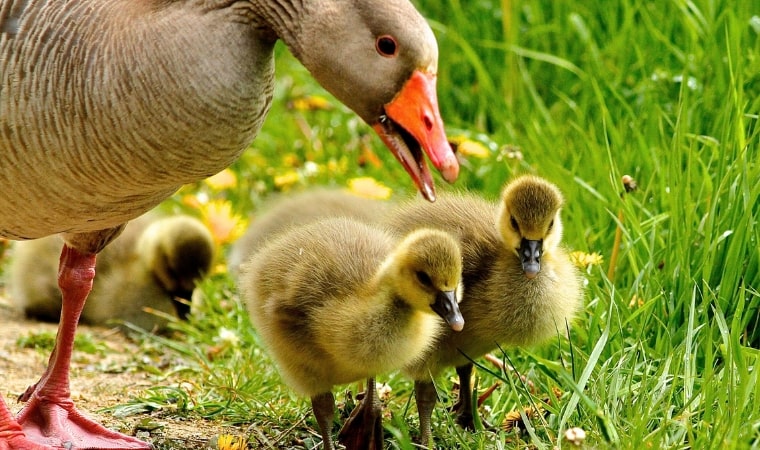Inside: Find out how to turn some baby ducklings at your local park, into a teachable moment with your child.
Do you have a duck pond at your local park?
If you do, then there’s a good chance that you will always stop and look at the baby ducks.
Which provides you with a golden opportunity to talk about where babies come from. Ducklings make a wonderful teachable moment!
You can read this article if you want to learn more about what a teachable moment is.
Watch the video below to get some ideas on how to do this (And just in case you’re curious (or your child ask), here’s an interesting read on how ducks have sex).
Read the transcription
You’re having a lazy weekend, so you decide to go to your local park and in the middle of that park is a great, big pond. As you’re walking around it you notice something, so you stop to point it out to your child. It doesn’t matter if your child is two, three, twelve, or even sixteen. Both of you go, ‘Wow, look! The mother duck has ducklings!’ You stop and look at them. How can you turn that into a teachable moment?
Hi, I’m Cath Hak from Sex Ed Rescue. Teachable moments, what are they? They’re everyday opportunities where you can teach something new to your child. The one we’re going to talk about today are baby ducks. Spring is that time where the weather gets warmer and animals start having babies. So, it gives you that lovely opportunity to start talking about what ducklings mean and where do they come from.
It’s a great opportunity to talk about reproduction. If you’ve got a younger child, maybe a three to seven-years-old, you could stop and go, ‘How do you think baby ducklings are made? Where do they come from?’ And they might say, ‘From inside the egg!’ ‘But where did the egg come from?’ Then you might talk about how the mother laid the egg but then ask, ‘How was the egg made? Did the mother make it by herself, or did she need some help?’ So, it’s a great opportunity to talk about mothers and fathers.
Now there are swans where I live and whenever they have babies, there’s the mother and the father. So, there are two adults and then the babies, sometimes we see ducklings with two parents as well. You can then lead that into a conversation about, ‘How do you think that happened?’ and then talk about, ‘How do you think you were made, or how do you think babies are made?’
You could use that to talk about how babies come from inside your uterus, or your baby bag, or inside their mummy. Then, as they get older, slowly add more information about how babies are made. If there’s just one duck, you could ask, ‘Where’s the other duck, why is there only one looking after the babies?’ So there’s a great opportunity to talk about how some families only have one parent, not two.
With ducks you can also talk about how ducklings will grow bigger and become adult ducks. That all children and all animals grow up. Ducks too will go through puberty so you can talk about that.
Also, if I’m walking with my twelve-year-old, we might talk about, ‘How do you think ducks might have sex? Do they go off and do it somewhere private? Do they do it with any duck or do they have a special duck that they do it with?’ So, we could talk about that with older children. It’s that great opportunity to sit down and say, ‘Well, you know what? Ducks don’t have contraception. They can’t use contraception to stop having babies.’ That can then lead into a discussion about humans and contraception. Sometimes, it’s about thinking outside the box. Sometimes, my teachable moments fail. I might start going on about something and my kids might be like, ‘That just does not make sense at all.’
But that’s totally okay because we’ll laugh and ask what I was talking about. Sometimes, I could talk about something and my child might sit there and say nothing. That doesn’t matter because I talked about it and now they know that it’s okay to talk to me about this stuff. Kids aren’t stupid. They pick up that sex is a taboo topic in society and they can’t go to school and talk about how ducks have sex and how they’re made because they would be seen as different.
But, teachable moments sometimes fail. So, just because my child isn’t saying anything, I know they’re listening and I’m giving them the message that I’m askable. Even though they may not respond, and they may or may not take some of it in, they know that they can come and talk to me about this stuff.
Sometimes, you might have an idea about a teachable moment and it just falls flat. One time I took my son to the fair and he bought a Minecraft sheep and was talking about it. I said to him, ‘Well, how do you make a Minecraft sheep?’ He proceeded to tell me about how Minecraft sheep have babies.
Apparently, one jumps on the back of the other and jumps off and that’s it; they just have more sheep. We tried to talk about it, but my son was not interested in hearing about how sheep reproduce. All he wanted to do was play with his toy, so sometimes, teachable moments don’t work.
So that is an example of how to turn baby ducks, or any baby animal, into a chance to talk about where they come from, how they’re made, or anything else.
Okay, I hope that helps, have a good one. Cheers.


